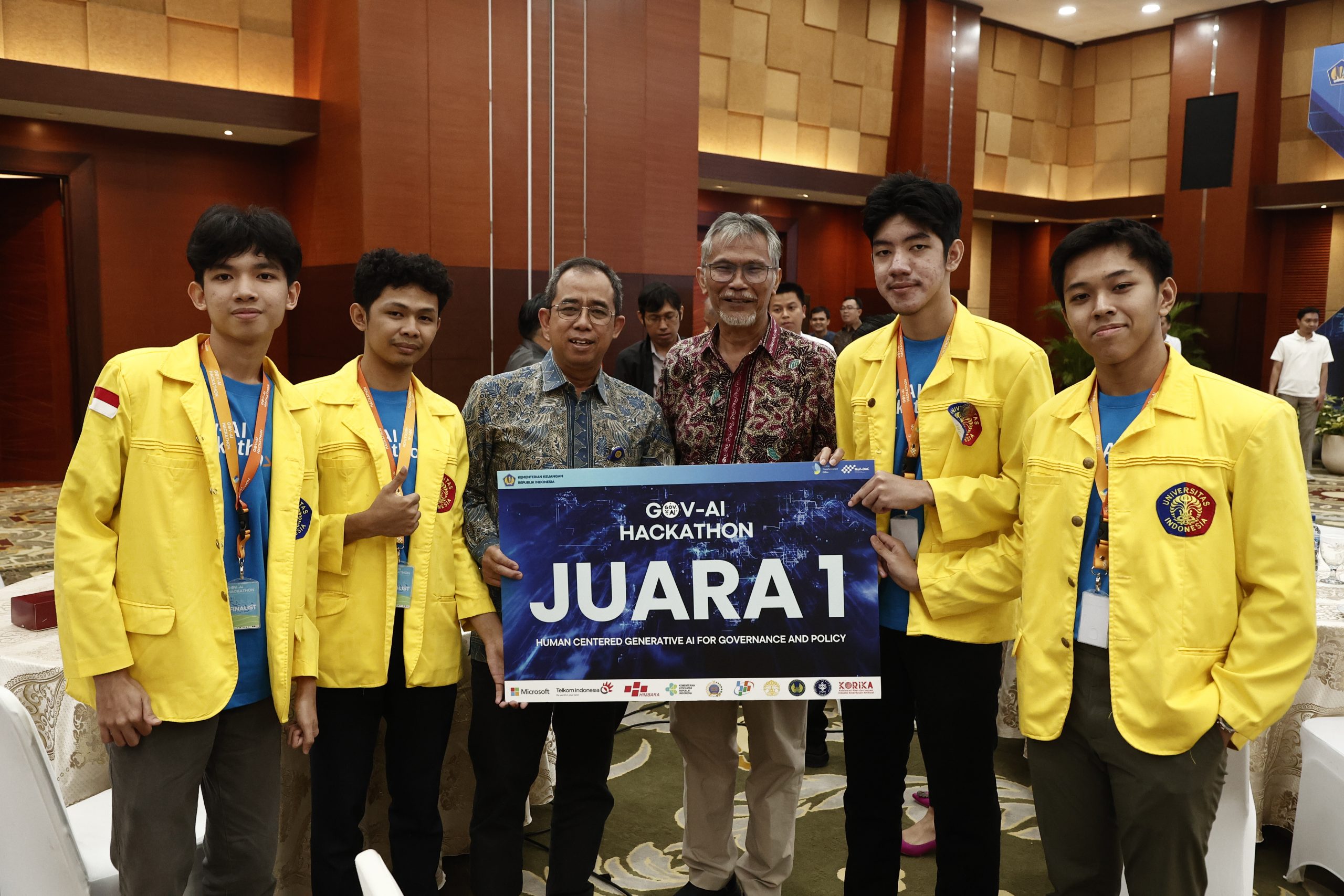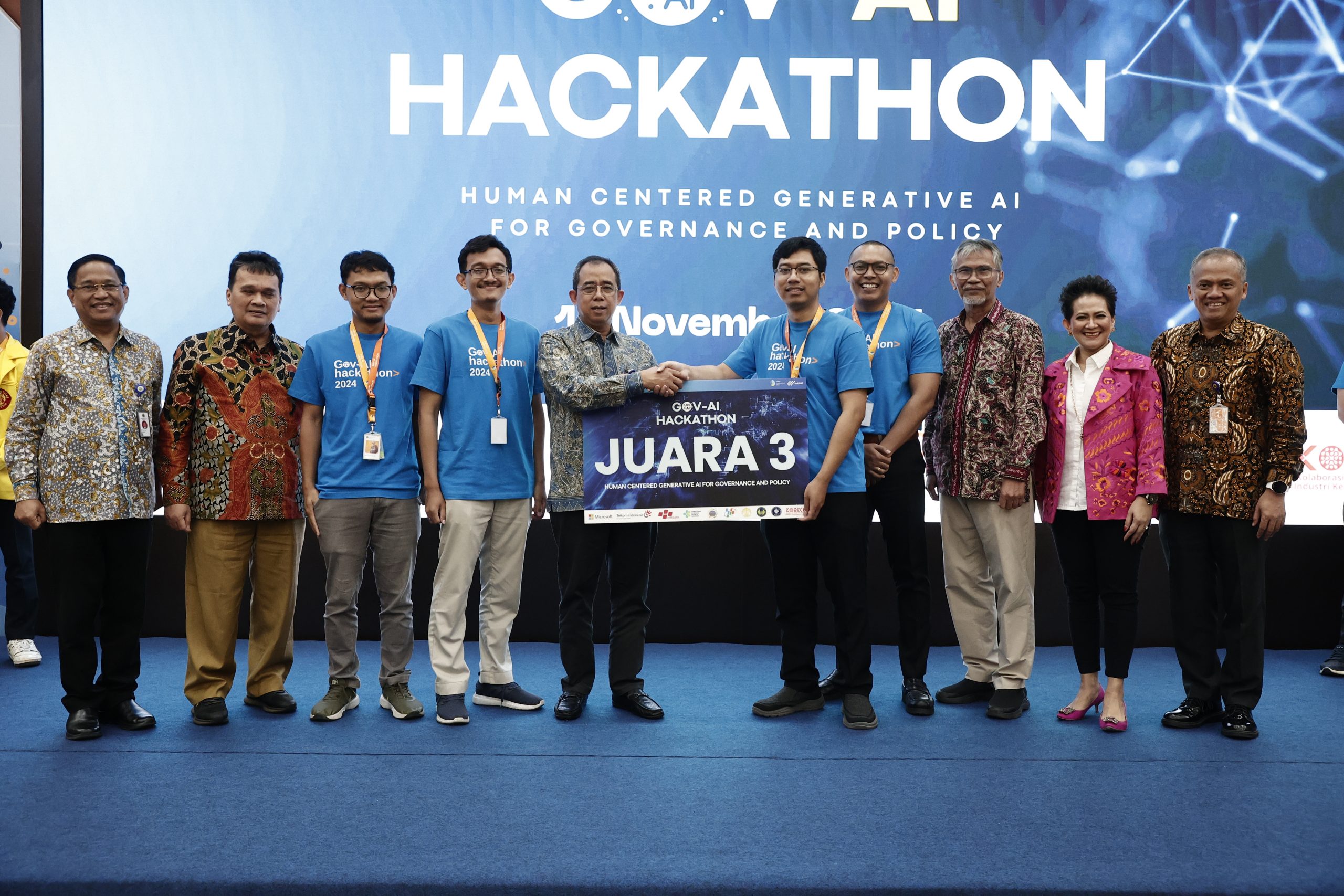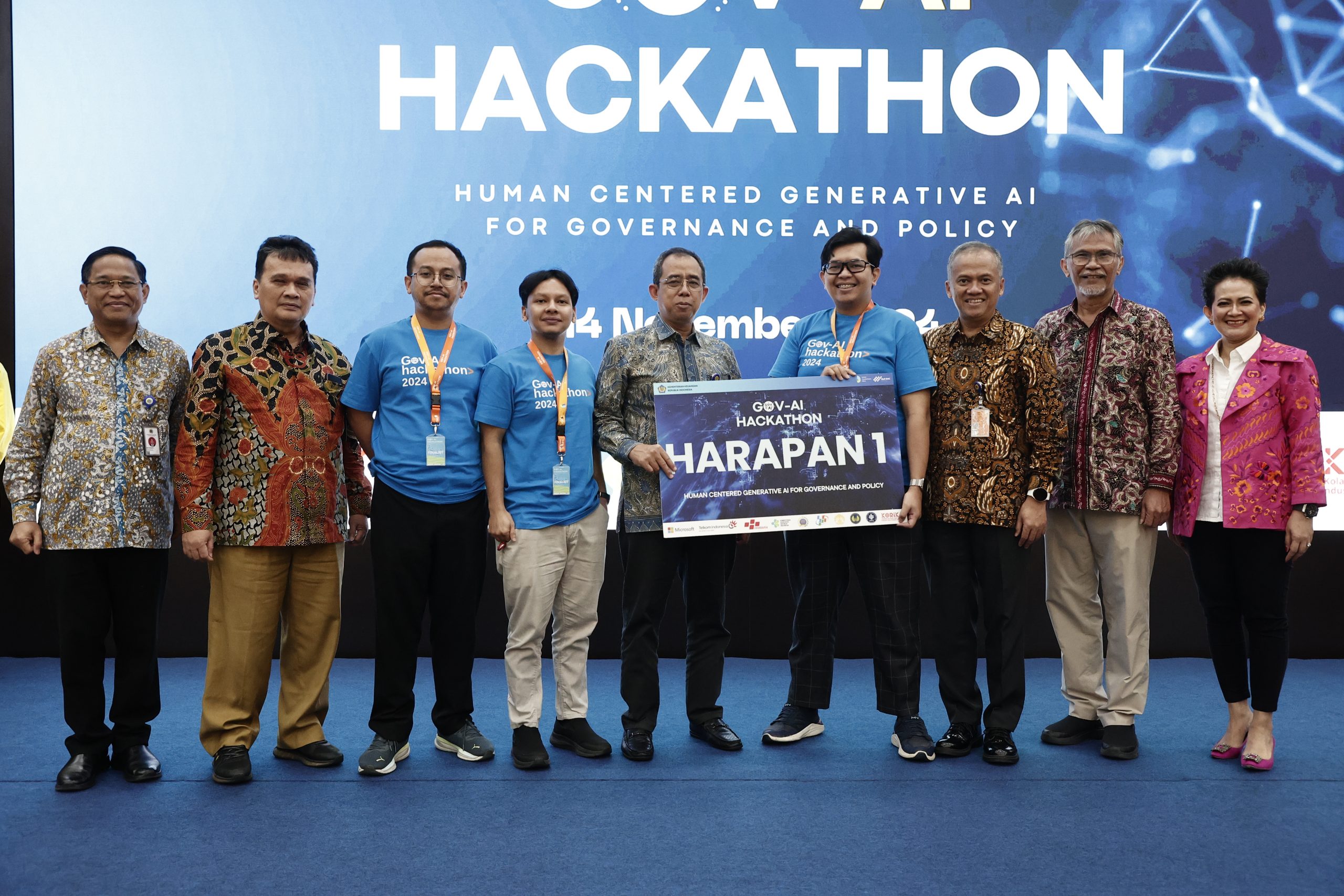GovAI Hackathon Produces Five Generative AI Solutions to Improve the Quality of Government Services in Indonesia
The Ministry of Finance, in collaboration with the Ministry of Foreign Affairs and the Ministry of Health, along with Microsoft Indonesia, Association of State-Owned Banks (Himbara/Himpunan Bank Negara), and Telkom Indonesia, have successfully concluded the 2024 GovAI Hackathon series. The innovative competition, open to all Indonesians, aimed to drive AI breakthroughs in artificial intelligence (AI) – especially generative AI – across four critical themes in government services. This year’s event attracted 191 teams comprising 495 participants, an increase of more than 100 percent compared to the previous year’s event with 93 teams from 271 participants.
The four themes addressed during the competition included: (1) stunting prevention and improving school children’s nutrition, (2) integrated and responsive digital public services, (3) economic diplomacy and empowerment of MSMEs for exports, as well as (4) transparent and accountable state financial management. Additional institutions, such as MoF-DAC, BPS, BRAIN IPB, KORIKA, University of Indonesia, and PKN STAN, also played active roles in organizing the 2024 GovAI Hackathon.
Agus Rofiudin, OBTI Expert Staff and CIO of the Ministry of Finance said, “Indonesia has entered the digital era at an accelerated pace. With internet penetration exceeding 72%, the potential for leveraging technology, especially AI, in the public sector to enhance the quality of life is immense. That’s why we organized the GovAI Hackathon—to gather innovative, AI-driven ideas from Indonesia’s brightest talents to assist the government in delivering higher-quality public services.”
The event series, which began in October 2024, was inaugurated with AI training open to the public. These included seven online classes led by speakers from Microsoft and Nawatech, attended by over 1,000 participants. Armed with the training, a total of 147 teams submitted their generative AI solution ideas, with 10 selected teams receiving further assistance from Microsoft, the Ministry of Finance – Data Analytics Community (MoF-DAC), and other Ministries and Institutions to create Minimum Viable Products (MVPs)[1] for their ideas, using Microsoft Azure technology. Of the 10 MVPs, 5 have now been selected, and their MVPs will be realized in government programs.
Acep Somantri, Expert Staff for Management of the Ministry of Foreign Affairs said, “The highest appreciation for the participants of the GovAI Hackathon 2024 who have provided inspiration for various improvements to government services based on generative AI technology. The ideas with a complete technology architecture from the participants are proof of the great potential of AI in Indonesia. We believe that collaboration between the government, the private sector, and academia will drive greater progress in Indonesia’s digital transformation, for the well-being of the Indonesian people.”
Five Selected Solutions for Indonesia
Here are the five selected solutions, which have realized their ideas into the form of MVPs:
UINNOVATOR with NuSantap, an innovative solution that integrates generative AI technology and computer vision. By utilizing AI algorithms, NuSantap is able to provide menu recommendations that are tailored to the nutritional needs of each individual and the availability of local food resources. Computer vision technology is used to accurately detect signs of nutritional deficiencies.
AI network with DIPLOMAT-AI, a generative AI for market intelligence analysis, mapping MSME export potential and foreign market penetration. The platform provides a one-stop solution with various analysis tools and AI-based prediction models, which are used to estimate market potential in various accreditation countries. In addition, DIPLOMAT-AI also offers comprehensive trade indicators, covering the role and direction of trade, trade structure, applicable regulations, and trade barriers in the destination country. DIPLOMAT-AI is equipped with a Retrieval-Augmented Generation (RAG)-based interactive chatbot generate Market Intelligence Report feature. This feature allows users to get market reports automatically compiled in PDF format as an easily accessible reference, as well as an interactive chatbot service that can answer questions about regulations, tariffs, and market opportunities in real time.
Project Ember with an AI-based solution that assesses carbon sequestration potential using satellite imagery. Data from satellite imagery that contains visual information about specific areas, such as vegetation and land conditions, is used as a raw material to map areas that have the potential to absorb carbon. Furthermore, the AI works to identify areas of interest by classifying which areas of vegetation and non-vegetation are highly accurate. Once the area of interest is identified, the analysis continues with the calculation of carbon potential based on plant type and area. Then adjustments will be made based on the density and health of the vegetation so that the resulting values are close to the actual conditions. The results of the analysis were converted into economic value estimates based on carbon price information in the current market.
AI4Indonesia with Trace.AI (Transparent Review and Cost Evaluation Powered by Gen-AI), an innovative generative AI-based solution to review and evaluate budgets effectively and transparently. This solution is automatically able to check proposal documents, as well as compare prices with internal and external data to detect indications of markup (adjusted to Government Regulation Number 12 of 2021 concerning the procurement of goods and services). Furthermore, the systems in this solution will provide data-driven recommendations and necessary actions, increasing efficiency, transparency, and accountability in every step of the procurement process.
Timses AITIES with Ainara, an innovative solution that integrates blockchain technology, smart contracts, and generative AI to create real-time transparency and accountability in village fund management. Every transaction is permanently recorded on the blockchain and smart contracts; ensuring that the disbursement of funds only occurs when conditions are met, thereby reducing the risk of corruption. With LaporNara, project progress reports are automatically compiled and can be accessed by the public through the PantauNara dashboard to facilitate monitoring. In addition, AwasNara detects expenditure anomalies that ensure funds are used according to standards. Ainara supports more open and participatory oversight and contributes to building a transparent and accountable future for villages.
In addition to the five selected solutions, special appreciation was also given to the other five finalists, namely:
- Sigma with the development of multi-agent AI in providing harmonized system code recommendations
- Sasyaditomonica with GARDA, Generative AI for Risk and Threat Detection
- Tomodachi with Mool Intelligence, a generative AI-powered government services marketplace
- NUTRI TEAM with NutriCare 1000, nurturing the first 1,000 days with AI
- Treasury Data Lab with FORTRESS-ID, Forecasting Overseas Risks and Threat Responses
Maya Arvini, Director of Public Sector at Microsoft Indonesia, stated, “We are honored to participate in the 2024 GovAI Hackathon. The surge in the number of participants this year indicates the rapid adoption of generative AI technology in Indonesia. This speed is in line with the findings of the 2024 Work Trend Index from Microsoft and LinkedIn, where 92% of knowledge workers in Indonesia are recorded to have used generative AI in the workplace, surpassing global (75%) and Asia Pacific (83%) figures. It is not only about speed; the ideas in the proposal and recommendations for a comprehensive technological architecture reflect real solutions to various critical issues in Indonesia. These ideas will create strong pillars to support Indonesia’s journey towards a Golden Indonesia 2045.”
###
[1]An early version of the product with the most basic features needed to meet the needs of early users. The goal of an MVP is to test business assumptions and get feedback from users quickly, so that developers can iterate and make improvements based on real data.















